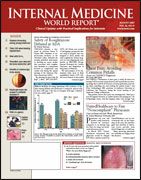Publication
Article
Internal Medicine World Report
Low-Fat Vegan Diet Sustains Weight Loss, Glycemic/Lipid Control
Author(s):
By Jill Stein
CHICAGO—A low-fat vegan diet promotes weight loss and glycemic and lipid control in patients with type 2 diabetes, and the improvements appear to last for well over 1 year, according to data released at the American Diabetes Association (ADA) annual meeting.
What is more, the vegan diet produces larger improvements in reaching glycemic and lipid goals than a diet that follows the ADA guidelines.
Neal Barnard, MD
Neal Barnard, MD, adjunct associate professor of medicine at George Washington University in Washington, DC, and founder of the Physicians Committee for Responsible Medicine, and colleagues presented 74-week data in 99 patients with type 2 diabetes who had been randomized to a low-fat vegan diet or to an ADA diet.
His group had previously reported 22-week data showing that the vegan diet had "significantly favorable" effects on glycemic, weight, and lipid control. The magnitude of the hypoglycemic effect was similar to that typically seen with single-agent drug treatment.
"Although diet and lifestyle factors play important roles in the worsening diabetes epidemic, researchers have long been pessimistic about the effectiveness of diet and lifestyle changes for the management of diabetes," Dr Barnard observed. "In fact, diet changes are no longer recommended as a sole first-line therapy."
A key issue in the use of therapeutic diets is long-term efficacy, he continued. For this reason, his group decided to follow the participants in the trial for an additional year.
The prescribed vegan diet consisted of vegetables, fruits, grains, and legumes. Participants were encouraged to avoid animal products and added fats and to favor low-glycemic-index foods, such as beans and green vegetables. There were no restrictions on portion sizes or the intake of energy or carbohydrates. The vegan diet called for about 10% of energy to be derived from fat, 15% from protein, and 75% from carbohydrates.
The prescribed ADA diet was individualized based on body weight and plasma lipid concentrations. Individuals assigned to the ADA group who had a body mass index >25 mg/m2 were prescribed energy intake deficits of 500 to 1000 kcal.
With the ADA diet, about 15% to 20% of calories come from protein, <7% from saturated fat, and 60% to 70% from carbohydrates and monounsaturated fats. Patients are allowed up to 200 mg/day of cholesterol.
Overall, 42 patients in the vegan diet group and 45 patients in the ADA diet group completed the study. Although medication use was supposed to remain constant during the trial, 35% of patients on the vegan diet and 20% on the ADA diet re-duced the dosage of their antidiabetic medications, mainly as a result of hypoglycemia.
Results showed improved outcomes with the vegan diet compared with the ADA-recommended diet (Table).
Among 74-week completers who did not change their medications during the study, hemoglobin (Hb) A1c changes were ?0.82 and ?0.21 for the 2 groups, respectively.
Lipid reductions are especially important in patients with diabetes, since coronary heart disease is the major cause of mortality in this population, Dr Barnard said.
"The low-fat vegan diet appears to be more effective than the portion-controlled diets that have been widely prescribed up to now," Dr Barnard said. "Surprisingly, the vegan diet may be easier to follow, because it does not require any limits on calories or carbohydrates," he added.
He also noted that it is possible that the vegan diet may actually help prevent diabetes. "Studies show that vegetarians have significantly less diabetes compared with omnivores," he said.
Table. Vegan vs ADA-recommended diet in type 2 diabetics, by 74 wk
Patient outcomes
Vegan diet
ADA diet
HbA1c changes from baseline, %
-0.40
+0.01
Total cholesterol, mg/dL
-20.4
-6.8
LDL-C, mg/dL
-14.0
-3.4
Weight loss, kg
  6.8
 4.9





